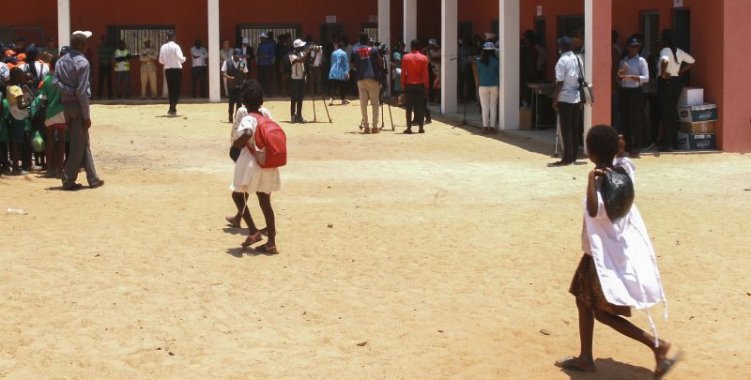Launched in 2019, the project, which already has 18 schools and 10,000 beneficiaries, is being implemented by Unicef (United Nations Children's Fund) and by Banco de Fomento Angola (BFA), having opened this Monday the fifth school, out of a total of six that are part of the project in the municipality of Ombadja, one of the most affected by the drought.
"The idea of the Porto Seguro project is to have integrated actions, starting with the improvement of starting infrastructures, in this case the schools, from which birth registrations and other actions that involve communities and benefit children are developed", UNICEF representative in Angola, Ivan Yerovi, told Lusa.
Speaking to Lusa, Denise Pinheiro, coordinator of BFA's social responsibility department, said that schools are used as a pivot to develop basic child protection services, including birth registrations, which have already reached 80,000 people, of which 15.000 children.
At the recently opened school in Maputa, near Xangongo, 90 kilometers from the capital of Cunene, Ondjiva, where more than 400 children are enrolled, there was no lack of expressions of joy and greetings to the entities present, but despite the infrastructure to debut, with classrooms with desks and bathrooms equipped with washbasins and toilets, the faucets did not pour water.
According to Denise Pinheiro, the masonry school is just the first step, as access to drinking water is also part of the project.
In addition to the need to create permanent infrastructure, since in many "schools" children had classes under a tree, as in Maputa, in the 18 schools covered by Porto Seguro there are other support structures, including sidewalk cisterns, which collect rainwater, and latrines.
The project also involves training community leaders to reduce risks such as violence and abuse of minors, child trafficking - "a major problem in this region", underlined Denise Pinheiro - recording and tracking cases of malnutrition and promoting vaccination , in addition to the construction of latrines.
"Right now, we already have some villages that are certified and free of open defecation, which is a big problem, as well as other community development actions. It is an integrated and quite complete project", highlighted the BFA official.
The partners are also implementing the TUPPI initiative – Todos Unidos Para a Primeira Infância – aimed at children aged 4 years and older and before their integration into the school system.
Ivan Yerovi stressed that the drought in Cunene is cyclical and that the United Nations agency has essentially acted to reduce the number of children affected by malnutrition, which last year allowed 80,000 children in a state of acute malnutrition to be saved.
"We are responding to humanitarian situations that affect communities in the provinces of Cunene, Huíla and Namibe", he underlined.
According to the latest UNICEF humanitarian report, around 7.3 million people in Angola (a quarter of the population) face nutritional insecurity due to climate shocks and around 3.9 million children need help, a number that has been grow up.
By mid-2021, severe malnutrition among children aged 6 to 59 months had already exceeded 2020 total numbers, conditions that have worsened during the Covid-19 period.
Angola is facing the worst drought in 40 years, and the situation has worsened with more than 3000 internally displaced people in Cunene, particularly in the municipalities of Ombadja and Cahama, according to Unicef.
More than 2.3 million children are out of school in Angola and access to education in the south has been hampered by drought. Most children living in drought-affected areas do not have access or have limited access to distance learning programs through television or radio.







